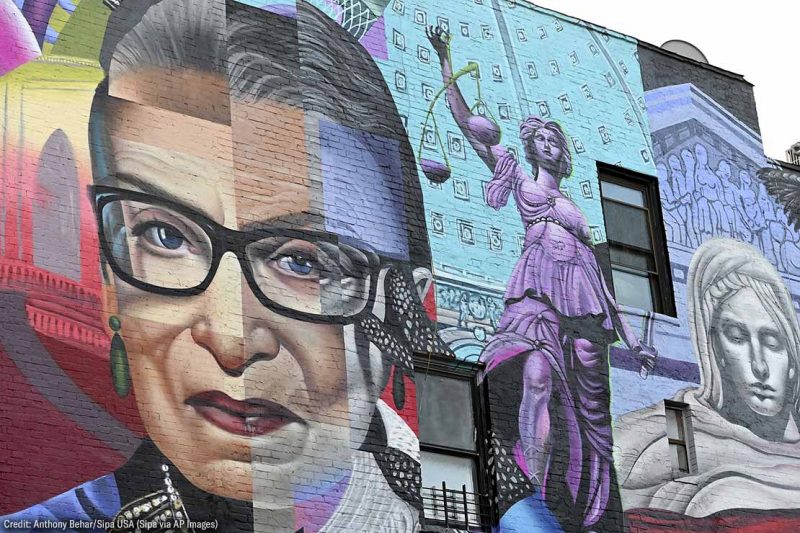What Insights Would RBG Offer About the Upcoming Supreme Court Abortion Rights Case?


One week ago, the Supreme Court it would consider a major case about abortion. The case, which directly challenges Roe v. Wade, raises the question of whether states can ban abortion. The legal right to abortion is at stake.
Yet, missing from much of the conversation about this crucial case is an explicit reminder of why we care, and why preserving Roe is not enough. There is talk of what the country might in terms of the legality of abortion if the court holds there is no federal constitutional protection for abortion, but little talk about gender equality, fairness, and racial justice. These are all essential for any real discussion of abortion and the promise and limits of its legality today.
As we face this threat now because of Justice Ruth Bader Ginsburg’s death and the confirmation of Amy Coney Barrett to the court, it makes sense to consider what Justice Ginsburg had to say about why abortion — and access to it — matters.
Justice Ginsburg was direct about the importance of abortion. During in her for appointment to the Supreme Court in 1993, Ginsburg : “Abortion prohibition by the State ... controls women.” She went on: “[W]hen Government controls that decision for her, she's being treated as less than a fully adult human responsible for her own choices.”
Dignity and are at stake, and she made that clear: “[I]t is essential to a woman's equality ... that she be the decision maker, that her choice be controlling, and that if you impose restraints and disadvantage her, you are disadvantaging her because of her sex.”
For Ginsburg, the government perpetuated sex discrimination when it denied access to abortion. And it perpetuated sex discrimination when it pressed women not to have children, forcing them to decide between . And it went further, practicing eugenics when it women.
In 2007, Justice Anthony Kennedy, writing for the court, outlawing certain abortion procedures. In the decision, he infamously speculated that some women might regret their choice to have such an abortion. His court’s solution? Ban the procedures to avert this hypothetical regret.
Justice Ginsburg, in turn, is famous for , which highlighted Kennedy’s archaic logic: “This way of thinking reflects ancient notions about women’s place in the family and under the Constitution — ideas that have long since been discredited,” including men’s role to serve as “woman’s protector and defender.”
Justice Ginsburg never spoke of the importance of abortion rights to transgender men and nonbinary people, and how pervasive and archaic notions of sex have thwarted even visibility for those who don’t conform to persistent gender norms. (She did vote to come before her.) But her analysis of dignity, of control, and of the harm of stereotypes points in only one direction: Restrictions on abortion constitute sex discrimination for nonbinary people and transgender men, as well as women.
Following the high court’s latest abortion-related news, the headline — “gender justice is at stake” — doesn’t run across the fold of any paper I’m reading.
Nor does the coverage in the major press always trumpet the truth: For many, abortion is already as good as banned. Hundreds of thousands could join their ranks. Even today, while the constitutional right to abortion still exists, people’s ability to get the care they need depends in large part on where they live and how much money they have. Ginsburg recognized this: She spoke of the economic realities that limit abortion, even where it is legal. She spoke of the “” where we have “one law for women of means and another for poor women,” where “poor women don’t have choice” and women of means do, and always will.
People of means will be able to travel the ever larger distances to get to an abortion provider, to take time off work, to secure child care, and to pay for the abortion — which the government bars insurance from covering in many places. The same is simply not true for many who are poor. These barriers to getting reproductive care will be felt most acutely by Black people, given the wealth gap that results from systemic inequality.
Even today, with abortion in every state protected by the Constitution, this care is as out of reach for many as if it were illegal. Too much talk focuses on legality; too little on the ability to actually get the care one needs. Too little on the federal government’s continued of abortion from insurance for the poor (Medicaid), for Native Americans, federal employees, and more.
This isn’t to say that legality doesn’t matter; far from it. The number of those unable to access abortion will increase substantially if abortion were to become illegal in a swath of states; the journey required will no longer be across Mississippi for example, but perhaps to Illinois.
The major press also aren’t centering what the court’s decision to hear the abortion case means for people of color. Women of color are more likely to have abortions than other women, because of longstanding disparities in access to contraception, discrimination in health care, and economic inequalities that make raising children more difficult for many, among other reasons. Any decision of the court to reduce federal protection for the right to have an abortion won’t address discrimination or increase resources for Black people and other people of color, it will simply erect more obstacles and add to injustice.
The court took a case about abortion, to be sure, but it also took a case about gender justice, racial justice, and economic justice. It took a case that calls on us to recognize the import and limits of the right we have now. It took a case that demands that we start talking about what’s really at stake, so we can fight for and secure something other than a “sorry state” where only some have access.

